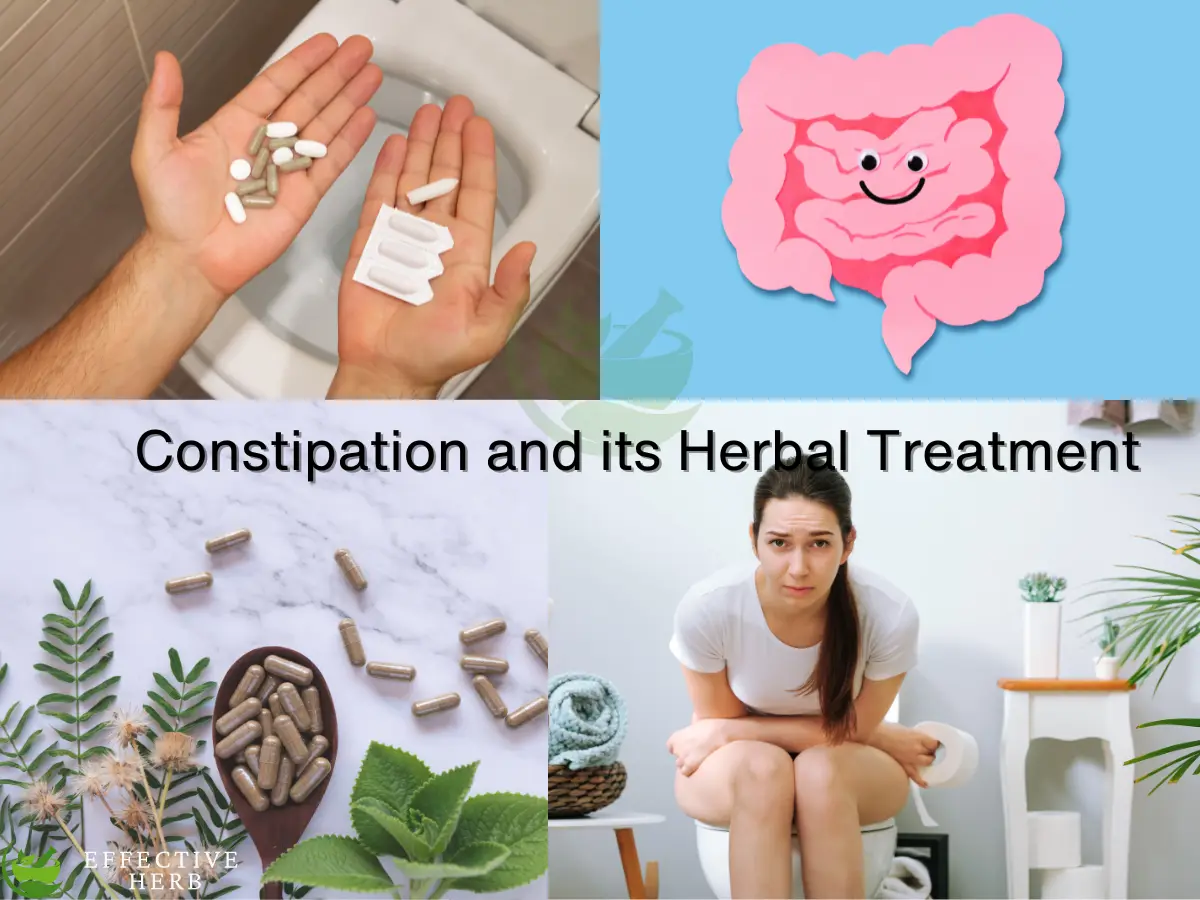Constipation and its Herbal Treatment
First, we may have a bird’s eye view of the knowledge about constipation available at different health platforms. Very briefly, it has been described in this content about the anatomy, physiology, and treatment of the relevant organs. Also, a new holistic approach under the Traditional (Unani) Treatment System, successfully working, has been narrated briefly at the end of the content. However, the holistically functional treatment prescribed there is entirely beneficial to constipation.
What is Constipation?
Constipation is one of the disorders of the gastrointestinal tract. The functions being performed by this tract include: chewing, swallowing, digestion, absorption, and smooth excreting of poop. Constipation is a functional disorder of muscle tissues of the large intestine. These muscle tissues are responsible for the movement of the intestine.
Digestive Organs responsible for Costiveness (uncountable)
Dysfunction in following intricate digestive components can lead to constipation, with the large intestine’s role in water absorption and the coordination of anal sphincters and pelvic floor muscles becoming pivotal factors in regulating bowel movements and influencing stool retention.
Large Intestine (Large Bowel)
The large intestine is the last portion of the gastrointestinal tract (GIT). Its’ function is to absorb water from the remaining indigestible material and pass it as a stool. It starts its way by joining the bottom end of the small intestine.
Rectum and Anal Canal
Rectum is the last portion of the large bowel. It’s about 20 centimeters long. The poop is collected here until the bowel is empty. Below the rectum, there is an anus having a length of about 3-4 cm. The mucus membrane lines it. The nerves are also present here to help the brain to feel and signal about the stoppage of stool and release thereof. According to the situation, the sphincter muscles and hemorrhoids close and open the anal canal under the brain’s orders.
Anal Sphincters
The inner and outer (internal and external) sphincter muscles exist at the end of the anal canal. They are involuntary and voluntary, respectively, in nature. Smooth muscles, in ring-like shape, make the inner sphincter.
To help Sphincters, hemorrhoids exist just inside at the end of the anal canal. They are the tissues full of blood vessels; when these are enlarged due to some medical reasons, they may be troublesome. It is called piles.
Pelvic Floor
Muscles, ligaments, and connective tissues make up the pelvic floor. It supports pelvic organs to hold their position. It also closes the lower part of the pelvic floor but allows them to pass through the vagina, urethra, and rectum so that they may find their openings here. The pelvic floor muscles relax during bowel movement and contract when the stool is to be held.
Process of Releasing Stool
The epithelium absorbs the water present in the indigestible material in the descending colon. It gets dried and is converted into a stool by traveling ahead into the rectum, where it collects. When the rectum is filled, the part of the nervous system in the rectum activates to complete the process of excreting the stool by relaxing and contracting the abdomen, pelvic, and sphincter muscles.
Disorders of the Rectum and anal canal
- Anal fissure
- Anal itching
- Anal cancer, bleeding with bowel movements, and pain.
- Anorectal abscess
- Anorectal fistula
- Fecal incontinence
- Foreign objects in the anus and rectum
- Piles
- Constipation
Factors Relating to Constipation
The chances of constipation are enhanced due to the following:
- Less amount of fiber is present in the diet. The excessive amount of fiber helps in bowel movement.
- Less water is included in the diet.
- In diet, too often there are cold items, i.e., ice cream, cold water, and cold milk. The cooling slows down the bowel movement.
- Not doing exercise as it supports the digestive system.
- The lack of natural bowel movement increases absorption of water from the stool by the intestine. This excessive absorption results in the drying out of the stool, making its expulsion challenging.
Medication and Disease Factors
Continuous use of different medicines may also cause constipation, which includes:
- Anti-depression medicines.
- Pain killers.
- Antacids medications.
- Anti-blood pressure.
- Antinausea medications.
- Irritable bowel syndrome ( IBS)
- Slow working of the thyroid gland.
- Diverticular disease.
- Colorectal cancer, etc.
Critical Analysis of the Factors
A critical analysis of the factors listed above has been made here below. These factors are generally considered the cause of constipation.
Effects of Cold-Inducing Diet on Bowel Function
The diet items having cold temperature or cold in nature activate the body’s neural cells, particularly the large bowel being the center of disease, in case of constipation. Due to triangular adverse coordination among the cells, epithelial and muscle cells are affected adversely by slowing down and becoming weak in their function. Due to the weakness of the muscle cells of the large bowel, its movement becomes slow, resulting in the stoppage of stool. Such repeated action will cause constipation.
Medications and Neuronal Impact on Bowel Movements
Similarly, medicines having the exact effects of activation on neuronal cells slow down bowel movement. For example, Potassium Nitrate, Potassium Carbonate, Chicory plant (Endive) seeds, Water Lily, Rose flower, etc. All these enhance the amount of urine and slow down the movement of the large bowel, causing constipation. The other factors, including dietary and environmental, i.e., cold weather, have the same way of action.
Acidity-Enhancing Factors and Constipation Development
Now go towards diets, medicines, and psychological factors like stress, tension, and anxiety, which enhance acidity in the blood, for example, meat, brinjal, tomatoes, potatoes, milk, yogurt, iron, calcium, aluminum, etc. These items activate the muscle cells and enhance acidity but weaken the function of neuro cells, causing a low level of messaging regarding bowel movements. Ultimately, there will be constipation. Such substances decrease the amount of urine by slowing down the function of epithelial tissues of kidneys.
Medication Impact on Kidney Function and Stool Dryness
All the medicines listed above under the heading ‘Medication and Disease Factors,’ if used continuously, badly affect the kidneys’ function, causing an imbalance of elements found in blood and needed by the body, i.e., water and salts like calcium and aluminum, etc. This imbalance- ment, selectively on either side (slow or weak), enhances dryness in the matter of stool.
The factors relating to medical conditions (diseases ) may have effects according to their nature. The symptoms of an endocrine system, like hypothyroidism, diabetes, uremia, and hypercalcemia, are due to being slow or weak in the function of epithelial cells of those related organs.
Briefly, we have to keep in mind three basic body systems: the muscular system, the endocrine system, and the neurological system, while dealing with physiology of body organs, diseases, and treatment. They have a triangular relationship of working in case of any disease. Activation of one makes the second slow, and the third weakens in performance. While providing treatment, the slow one will be activated by its concerned herbal medicines.
How to Avoid Constipation
- Eat a diet full of fiber content, like fruits (orange, mangoes, berries, pineapples, and papaya), vegetables, whole grains, and bran cereal. These will help eliminate the consistency of indigestible material.
- Adopt the habit of taking exercise regularly and constantly. It will activate the whole muscular system, including that of the intestines.
- Add a sufficient quantity of water to your diet.
- Fulfill the urge for bowel movement as early as possible when it takes place. Avoid taking fast foods as a routine matter. Confine yourself to one or two items of meal only at a time. The items of different natures disturb the digestive system.
- Change your eating habits. Refrain from filling your stomach to its full capacity. Keep some portion of it empty.
Herbal Treatment of Constipation
New Approach to Treatment under Traditional Treatment System
Would you like to know a new approach to the treatment of constipation? This new approach is based on the basic unit of the body, i.e., the cell/tissue.
The symptoms of bowel movement being changed on a daily basis need not be worried about. These are the casual changes that take place according to diets ever-changing. A bowel movement should have a texture to some extent thicker than toothpaste and a heap-like shape once in 24 hours.
Having no bowel movement exceeding 3-4 days is a signal of constipation which will need certain treatment. This situation has been kept in view while talking about the issue.
The following are the types of different natural factors that affect our bodies and cause diseases:
- The diet we eat
- The drinks we have
- The environment we live in or do our activities/jobs
- Psychological effects(emotions and feelings)
- Different poisonous effects (bacterial fungal, viral, mineral, botanical, animal, and insect poisons)
- Inherited factors
All these factors, first of all, affect the function of cells. Primarily and ultimately, the cells, being building blocks, have to bring the body into its action. The cell may be activated, slowed down, or weakened in its function due to the effects of the above factors.
Herbal Treatment
Principles of treatment:
- Use laxatives.
- Activate excreting process.
- Lower the acidity level.
- Improve Digestive System
In case of ordinary constipation, take one tablespoon of Psyllium husk with water at bedtime for 2-3 days.
The prescription for constipation may include the following herbs. Grind all ingredients in powder form.
- Senna Folium (Leaves) – 20 g
- Carom Seeds (Ajwain) – 10 g
- Salt (Sodium Chloride) – 10 g
Note: In the case of hypertension patients, salt must be substituted with Cinnamon Tamala (Bay leaf) – 50 g
In acute conditions, take the dose of 5 g twice daily with lukewarm water. However, in chronic conditions, a dose of 2 g thrice a day.
Second prescription may also be beneficial:
Two pills of the following prescription would be sufficient for a regular bowel movement.
- Borax (sodium borate) – 50 g
- Extract of Aloe Vera (Aloe Barbadensis) – 50 g
- Black pepper (Piper Nigrum) – 50g
- Henbane (Hyoscyamus Niger) – 50g
- Pulp of Aloe Vera – 200 g
The first four ingredients may be powdered and mixed up with aloe vera pulp. Get the mixture dried, however, leaving behind some moisture to help make the pills. Make pills, each equal to one gram. Dry and preserve them.
Dose: 2 pills with lukewarm water at bedtime.
Constipation During Typhoid Fever
Typhoid patients may use 3-5 grams of the following mixture to have an easy bowel movement:
- Scammone – 10 g
- Cumin (Cuminum Cyminum) – 30 g
- Psyllium husk (Ispaghol) – 60 g
The first two ingredients may be powdered. Then mix the third one in this powder.
It is ready for use.
Dose: Acute condition, 3-5 g with water
A chronic condition, 3 g thrice a day.
Conclusion
In our journey through constipation’s intricacies, we’ve explored its causes, anatomy, and herbal remedies. From the digestive process to herbal treatments, we’ve unveiled a holistic approach to address constipation’s challenges. This knowledge empowers us to promote healthier bowel function and embrace natural solutions.







